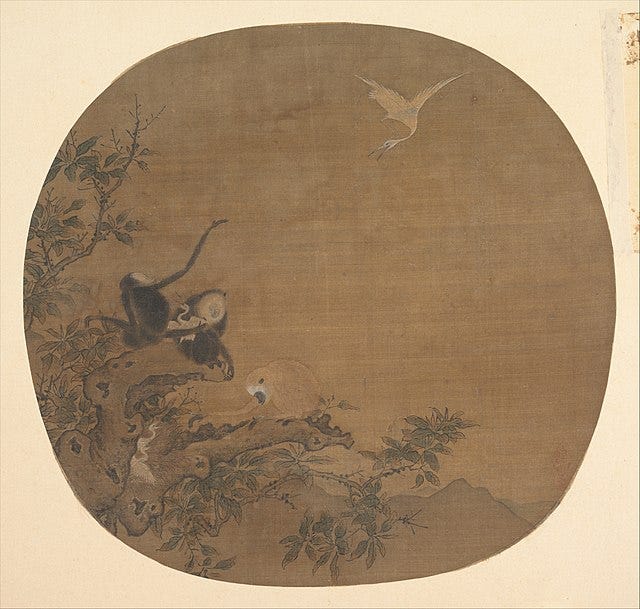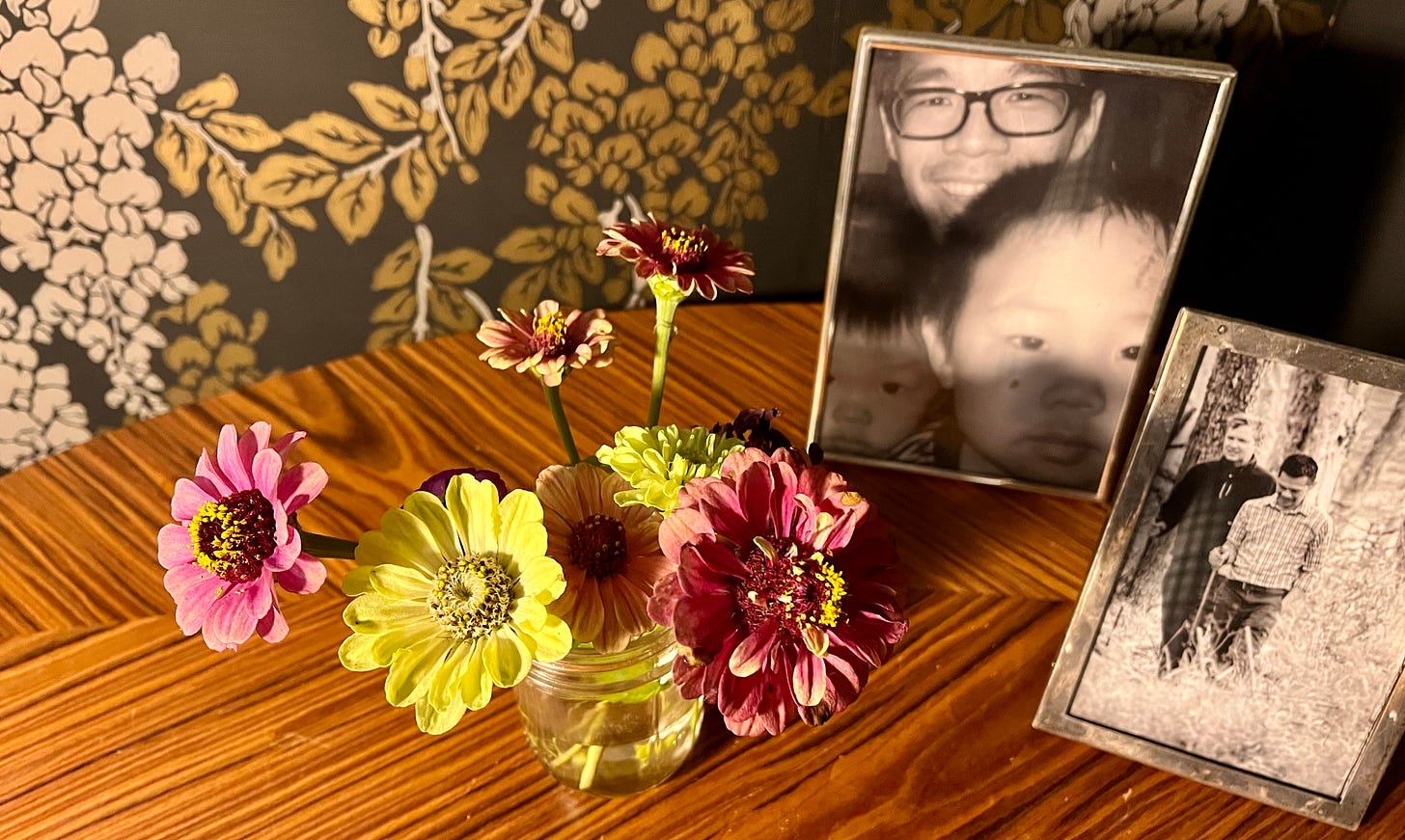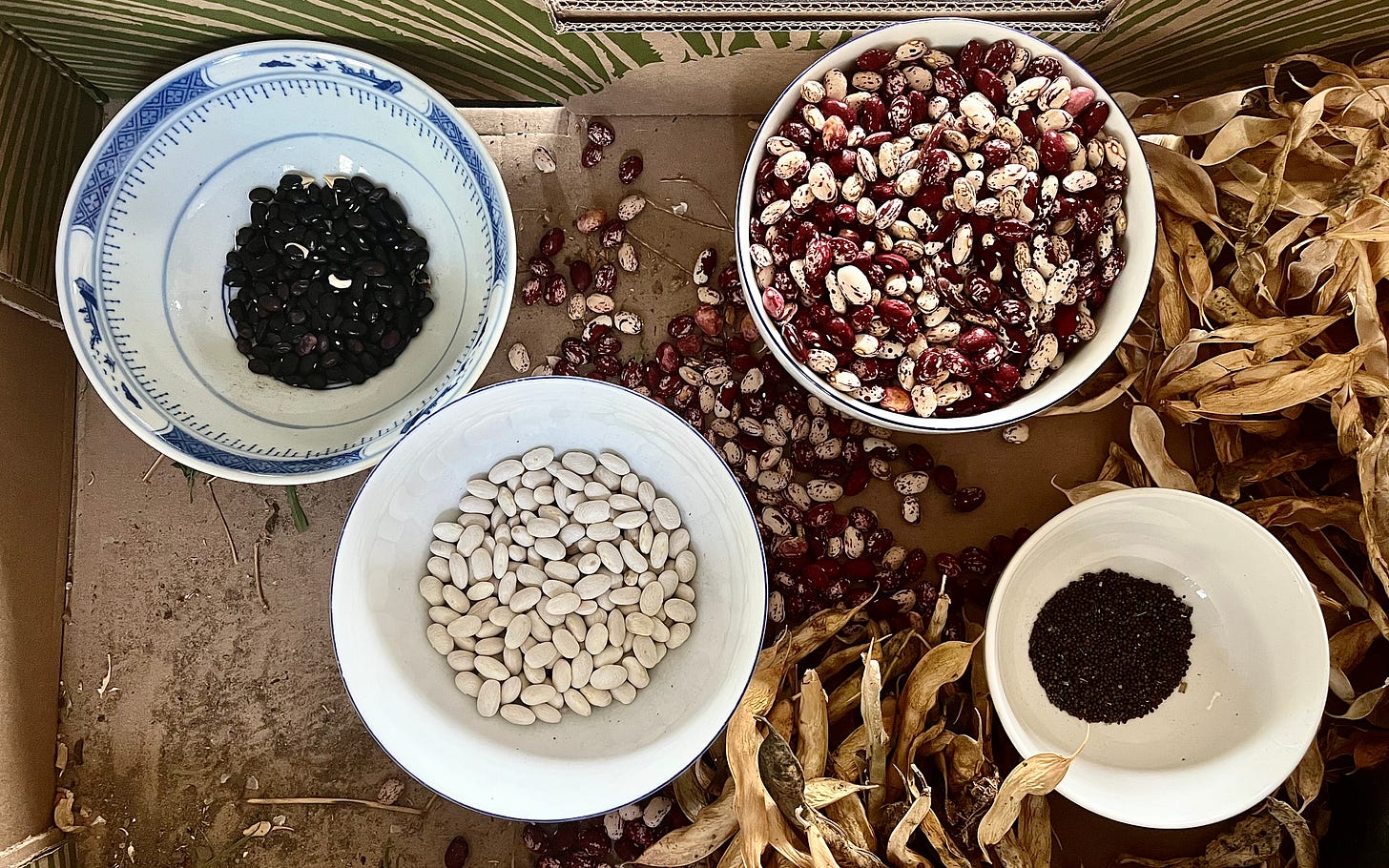See Something, Say Something
Some fragmented thoughts on suspicions and warnings, the invitations of beauty, ancient Chinese poetry, and dried beans
My friend Elizabeth, who lives in the west of England, was in her local Tesco the other day and noticed a small sign on the shelf: Seen something suspicious? Tell a member of our team. She took a quick photo and posted it with this note: “I wish that instead of encouraging us to be suspicious (in shops, on trains, etc.) there were signs that encouraged us to see beautiful generous good things.”
The sign reminded me of the posters I came to be familiar with on the New York City subway, which weren’t even as specific: If you see something, say something. It doesn’t say, “If you see something worrying...” or “If you see something threatening.” The assumption is that what you see—what you notice—will be worthy of your fear, of a warning, of alarm.
Much as I mentioned last week when I wrote to you about the too-muchness of the world, we’re trained on the things that stir anxiety, on sadness and tragedy, on all that induces rage and inspires fury. It’s more than a pattern of behavior. It’s a business model. It’s algorithmic fuel. It’s a political strategy. It’s a way of life.
We receive so much encouragement to be suspicious and even disdainful—of newcomers, of outsiders, of opinions and convictions that differ, of all that seems alien and strange, of whatever might portend danger, even of the people we used to be ourselves. Perhaps Elizabeth is right. Perhaps we need more encouragement to see the beautiful and the generous and the good, which can be overlooked so easily.
There are the zinnias on the table next to my desk, which I cut a few days ago. They aren’t perfect blossoms. But I love how they bear witness to pollen already gathered, to sustenance found, to transformation I can’t yet and might never see.
There was the mom pushing a double stroller, out in the afternoon sunshine, as Fozzie and I walked back from the garden with those zinnias. She looked so tired. Yet she addressed her youngsters with such gentle warmth. And then there was the glee that one of the kids expressed at the sight of the Fozz. “Puppy!!!!” she squealed. Fozzie, of course, was not so impressed.
There was the yellow-bellied sapsucker rapping on the side of the house this morning, which was maybe not great for the house? But then this little woodpecker, which I only recognized with the help of the bird app on my phone, perched on the power line outside my study window for a while. It peered in at me and gave me along moment to observe its stately red crown and the dappled glory of its black-and-white breast.

There was the classical Chinese poetry I’ve been reading as I write my book. One favorite this week was 欒家瀨 (literally, “Luan Family Rapids”), by the Tang Dynasty polymath Wang Wei, who poured his observations of nature into songs, poems, and paintings. Here are two different English renderings of this brief poem.
Blasts of winds amidst autumn rains Patter-patter upon rocky clod Jumping beads splash against each other. A white egret - startled - then down. (trans. Wai-lim Yip)
Wind buffets and blows autumn rain.
Water cascading thin across rocks,
waves lash at each other. An egret
startles up, white, then settles back.
(trans. David Hinton)Those two translations are quite similar, but then here’s another:
Under the spatter of the October rain The shallow water slides over slippery stones; Leaping waves strike each other And frightened, the egret dares not dive for fish. (trans. Chang Yin-nan and Lewis C. Walmsley)
So many questions about that last one: Who said it was October? Is being startled the same as being frightened? When did the fish enter the scene?

Some scholars have claimed that translating these centuries-old poems is essentially impossible. These ancient poets stripped their language down so much that poems were akin to impressionistic paintings. The first line of “Luan Family Rapids” has just five Chinese characters: 颯颯秋雨中. If you were to render them literally, it would be something like: Whoosh whoosh autumn rain midst. What do you do with that?
Deep humility infused the work of these old poets. They recognized that a poem would never be experienced as they felt it or as they intended it, distilled as it inevitably would be through the experiences and the filters of each reader. A poem was a poem, yes, but really, it was a prompt: What do you see? Will you notice even the smallest, seemingly most insignificant things? What is happening in this moment? Where to from here?
So while it might be impossible to create an English facsimile of the Chinese poem, it’s not at all impossible to translate—to convey something of the original’s beauty, to stir a wonder that might be similar but never exactly the same. In the spare wording, there’s lavish hospitality—so much room to imagine how to evoke a similar feeling, so many options to invite the reader to pause, to receive, to perceive, to imagine.
In this tumultuous world, in these unsteady times, I crave things that inspire possibility and point us to ways forward. Of course beauty can be a diversion or an escape or even a sedative, but it doesn’t have to be. Indeed, it shouldn’t be. To notice beauty is not necessarily to ignore ugliness—not at all. Rather, I want to know what we’re working toward and what we’re hoping in, not just what we’re opposed to and what we’re against. There’s plenty in this world that stokes my anger. What then?
I’ve been accused of naïveté—of course you, with your privileged life, can afford to focus on beauty. But nobody who really knows me has ever accused me of being a glass-half-full person. And there’s nothing naïve about beauty or its steadfast companion, hope. A spirit soft enough to feel deeply the world’s sorrow and suckage is also one that acknowledges the potential for something better—something healthier, something more joyous, something more nourishing. To be grounded in the reality of our lives is to recognize not just the devastation and the doom but also the goodness and the grace.
Beauty helps keep us tender. It protects us against the calcification of the heart and it gentles the soul, which is so often in danger of crusting into cynicism and scurrying into despair. To be wholly human is, I think, to be able to hold the both/and, never yielding to the constant temptation to overweight one or the other.
I need beauty that takes the shape of invitation—the nudge toward noticing, the prod toward possibility. Sometimes all it takes, because it’s already there, waiting to be perceived, is a tiny shift in perspective.
Lately, I’ve been spending a lot of time shelling the beans from our community-garden plot. Both Tristan and I have marveled at how much work it takes to produce just one pound of dried beans, labor that I suspect has been mostly mechanized. Because of the bean beetles this year, our yields are down. Still, we’ll get a few good dinners out of what we’ve got. Honestly, I’ve lost count of the hours that I’ve spent shelling, mostly as I’ve watched TV. But I’m almost done!
These beans are things of beauty, every single one. How, I wonder, might one of the ancient poets have regarded them? As I’ve worked my way through the crunchy pods—white beans and black, Jacob’s Cattle and Dragon’s Tongue—I’ve admired the stunning speckles, the diverse shapes, the deep colors. I’ve thought, too, about the meals to come, about the bacon fat that will enrobe these beans, about the friends and loved ones who will be gathered around the table.
I need the kind of beauty that is embodied in something as seemingly simple as a bean—witness of resilience, ready nourishment, inspiration for stories still to be written. I wish it for you too.
I’m going to keep this (relatively) short this week—and I’m not going to be in your inbox next week. My manuscript for Good Soil is due in 10 days, so the coming days will be all about not bringing shame on my family name by submitting [your metaphor for something not great here because I am fresh out of evocative imagery] to my editor.
Before I leave you, though, tell me about something beautiful—an unexpected grace, a sign of goodness—that you’ve seen lately and that inspires hope.
As ever, I’m so grateful we can stumble through all this together, and I’ll try to write again soon—after I turn that book in.
All my best,
Jeff





I've made it an intentional practice to ve aware of wonder all around me. Your writing helps to remind me.
Hello, Jeff.
Would you please e mail your paper mail address to me? I don't have $ online.
Thanks! I have an envelopes all ready to send a check.
We save our dry beans to shell in the cold time. We have a lot of French horticultural this fall, my husband shells them out fresh.
The other day, a praying mantis was on my truck, just beyond the windshield. It hung on bravely, as the wind increased. I was en route to the dentist; could've stopped, next time I will. It would've been my passenger!
Beautiful creature!
Patricia